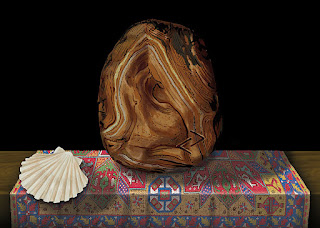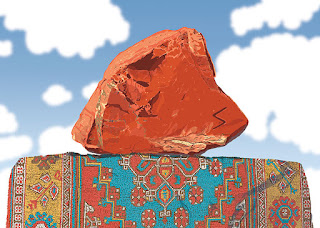Friday, 9 December 2022
Beryl Video: how I created it!
Friday, 10 June 2022
Sardonyx
In "Sardonyx", la cui traduzione è Sardonice, viene rappresentato il minerale in primo piano con incisa la runa Jera la cui capacità è di sviluppare la pazienza e di entrare in sintonia con la natura. La sardonice è indicata come quinta pietra di fondazione delle mura della Città Santa nell’apocalisse di Giovanni e indica l’apostolo Giacomo Maggiore. Accanto alla pietra vi è rappresentato il Pecten Jacobaeus, la conchiglia di San Giacomo, un attributo del santo pellegrino. La sardonice poggia sopra un tappeto anatolico di epoca rinascimentale, detto Crivelli, perché largamente usato nelle sue opere. Il tappeto è un omaggio al divino e per sua natura crea un’atmosfera mistica, ad ogni nodo intrecciato è legato il pensiero di chi lo ha lavorato dedicandovi ore della propria vita. Su di un tappeto persiano è stato scritto: “Hanno filato la sua trama col filo dell’anima”. Questo lavoro appartiene alla serie intitolata "Way back into Soul", in cui sono rappresentati antichi miti in chiave moderna.
In “Sardonyx", the mineral is represented in the foreground engraved with the Jera rune, whose ability is to develop patience and to get in tune with nature. Sardonyx is indicated as the fifth foundation stone of the walls of the Holy City in the apocalypse of John and indicates the apostle James the Greater. Next to the stone is represented the Pecten Jacobaeus, the shell of St. James, an attribute of the saint pilgrim. The sardonyx rests on an Anatolian carpet from the Renaissance period, called Crivelli, because it is widely used in his works. The carpet is a tribute to the divine and by its nature creates a mystical atmosphere, the thoughts of those who worked on it are linked to each intertwined knot, dedicating hours of their lives to it. On a Persian carpet it was written: "They spun its weft with the thread of the soul". This work belongs to a series entitled "Way back into Soul", in which ancient myths are represented in a modern way.
Saturday, 23 April 2022
Chalcedony
In "Chalcedony", la cui traduzione è Calcedonio, della varietà azzurra, viene rappresentato il minerale in primo piano con incisa la runa Mannaz la cui capacità è di aiutare a conoscere se stessi, ispirare la giusta relazione col prossimo e il divino, aiuta la cooperazione tra gli uomini per il bene comune. Il calcedonio è indicato come terza pietra di fondazione delle mura della Città Santa nell’apocalisse di Giovanni. Il calcedonio poggia sopra un tappeto caucasico Mogan, con il gul Memling, mentre sullo sfondo abbiamo un tappeto Bellini, sono chiamati così perché largamente usati dai due pittori nelle loro opere durante il Rinascimento. Il tappeto è un omaggio al divino e per sua natura crea un’atmosfera mistica, ad ogni nodo intrecciato è legato il pensiero di chi lo ha lavorato dedicandovi ore della propria vita. Su di un tappeto persiano è stato scritto: “Hanno filato la sua trama col filo dell’anima”. Questo lavoro appartiene alla serie intitolata "Way back into Soul", in cui sono rappresentati antichi miti in chiave moderna.
In "Chalcedony" of the blue variety, the mineral is represented in the foreground engraved with the Mannaz rune, it has the ability to help to know oneself, to inspire the right relationship with one's neighbor and with the divine, helps cooperation between men to the common good. Chalcedony is indicated as the third foundation stone of the walls of the Holy City in the apocalypse of John. The chalcedony rests on a Caucasian Mogan carpet, with the Memling gul, while in the background there is a Bellini carpet, so called because they were widely used by the two artists in their works during the Renaissance. The carpet is a tribute to the divine and by its nature creates a mystical atmosphere, the thoughts of those who worked on it are linked to each intertwined knot, dedicating hours of their lives to it. On a Persian carpet it was written: "They spun its weft with the thread of the soul". This work belongs to a series entitled "Way back into Soul", in which ancient myths are represented in a modern way.
Wednesday, 23 February 2022
Jasper



